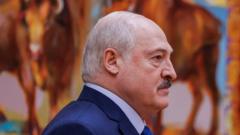In stark contrast to his previous elections marked by public fervor, the upcoming election reflects a climate of resignation and the absence of viable opposition, as many citizens have become indifferent to the democratic process in the country.
'Belarus Faces Election Indifference Amidst Lukashenko’s Dominance'

'Belarus Faces Election Indifference Amidst Lukashenko’s Dominance'
As the 2025 presidential election approaches in Belarus, public enthusiasm appears non-existent, leaving Alexander Lukashenko's continued rule largely unchallenged.
In Belarus, historical moments of fervent electoral engagement are notably absent as the nation approaches its presidential election scheduled for January 2025. Encapsulated by the cold winter and static atmosphere in the capital Minsk, disregard for the electoral process prevails. The election outcome feels predetermined, as Alexander Lukashenko, who has maintained a firm grip on power since 1994, is anticipated to secure a seventh consecutive term.
Dubbed "Europe's last dictator," Lukashenko's administration is characterized by opponents who dismiss the electoral process as farcical. The president has expressed a cavalier attitude toward the campaign, admitting he is not following it and humorously promising to test a recently gifted axe before the election. This detachment juxtaposes the significant unrest Belarus experienced post-2020 elections, when Lukashenko faced widespread protests and accusations of electoral fraud.
International bodies such as the European Parliament have condemned the impending election as a sham, citing a fraught environment devoid of the fundamental rights of democratic elections, with major political adversaries either imprisoned or exiled. Lukashenko has previously questioned the legitimacy of the criticism aimed at his regime, suggesting that the concept of opposition is distorted.
While four candidates will appear on the ballot, they are largely perceived as mere presences that reinforce Lukashenko's dominance rather than genuine contenders. Sergei Syrankov, leading the Communist Party of Belarus, openly endorses Lukashenko, claiming that no viable alternative exists to maintain stability, a sentiment echoed by voters wary of change. Similarly, Oleg Gaidukevich of the Liberal-Democratic Party recognizes Lukashenko's inevitable victory, focusing his efforts on fortifying party influence for future elections.
In the smaller towns of Belarus, a sense of instability looms large as citizens express a preference for the current government to ensure a steady lifestyle rather than risk upheaval with new leadership. As voices like Zenaida, a local resident, highlight, the fear of potentially sliding into chaos similar to that seen in Ukraine reinforces support for Lukashenko, creating a complex web of acceptance and resignation toward an electoral process that feels anything but democratic.
Dubbed "Europe's last dictator," Lukashenko's administration is characterized by opponents who dismiss the electoral process as farcical. The president has expressed a cavalier attitude toward the campaign, admitting he is not following it and humorously promising to test a recently gifted axe before the election. This detachment juxtaposes the significant unrest Belarus experienced post-2020 elections, when Lukashenko faced widespread protests and accusations of electoral fraud.
International bodies such as the European Parliament have condemned the impending election as a sham, citing a fraught environment devoid of the fundamental rights of democratic elections, with major political adversaries either imprisoned or exiled. Lukashenko has previously questioned the legitimacy of the criticism aimed at his regime, suggesting that the concept of opposition is distorted.
While four candidates will appear on the ballot, they are largely perceived as mere presences that reinforce Lukashenko's dominance rather than genuine contenders. Sergei Syrankov, leading the Communist Party of Belarus, openly endorses Lukashenko, claiming that no viable alternative exists to maintain stability, a sentiment echoed by voters wary of change. Similarly, Oleg Gaidukevich of the Liberal-Democratic Party recognizes Lukashenko's inevitable victory, focusing his efforts on fortifying party influence for future elections.
In the smaller towns of Belarus, a sense of instability looms large as citizens express a preference for the current government to ensure a steady lifestyle rather than risk upheaval with new leadership. As voices like Zenaida, a local resident, highlight, the fear of potentially sliding into chaos similar to that seen in Ukraine reinforces support for Lukashenko, creating a complex web of acceptance and resignation toward an electoral process that feels anything but democratic.






















